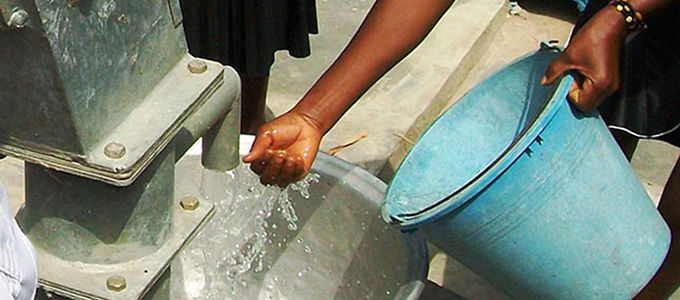Wasting it is unfair, contaminating it a crime
World Water Day is something that means little to people in industrialized countries. They have plenty of water while people in other parts of the world dream of being able to turn on the tap for a drink of water. A look at a divided world.

March 22 is observed as World Water Day. Since 1993, UNESCO has been reminding the world about water issues and how essential it is for life. Water is life. People die without water. Safe and clean drinking water is a human right, and has been embedded in the declaration of human rights. But this is still a far cry from reality. In many countries there is a shortage of water.
People in industrialized nations are often very careless with drinking water! A tap tempts people to waste water: a bath or a shower use up drinking water, soda is added to mineral springs and sold as expensive bottled water, and so on … Water is contaminated, wells are poisoned, and much of it is just thoughtlessly dumped or poured down the drain. In some parts of the world people complain about the rain, while other parts of the world suffer from drought.
Clean drinking water is a human right
Serious estimates assume that about 900 million people around the world do not have access to clean drinking water. This results in diseases which kill more children than malaria, measles, and AIDS together. Gastro-intestinal infections top the list.
Sick children miss more than 400 million days of school, meaning they miss out on a chance at education and a way out of poverty. Aggravating the situation is the growing world population and the rise of slums. Children who grow up in slums cannot follow the medical advice offered by experts in wealthy countries: they recommend that adults should consume at least 1.5 to 2 litres of liquids a day; and more is needed in hot weather or when people exercise a lot. The human brain consists of 85 per cent of water. A lack of fluids has a detrimental effect on our mental abilities and leads to brain fatigue and headaches.
Just knowing about all of this is not enough, however. Distribution is the issue here. The rich will have to give more to the poor to help alleviate suffering. This includes raising awareness that water is a food—a basic for survival. It is a vital resource and more precious than any other material possessions. Wasting water is unfair, contaminating it is a crime. This is what our children have to learn.
Well-building projects in Africa
We can donate to help alleviate some of the suffering. The relief organization of the New Apostolic Church in Southern Germany, Missionswerk, for example, has been involved with well-building projects for many years, an initiative that has helped many people. They are currently working on two projects.
- Clean drinking water for orphans in Tamale. The relief organization supported the completion of a water supply project here in northern Ghana with a donation of 1,000 euros. Water pipes were laid to an orphanage so that the 27 children who live there now have clean drinking water. A water storage tank was also placed to provide water in the case of an emergency.
- A well for Gambella. Clean and clear water bubbling from a well is a rare picture indeed in this south-western part of Ethiopia. The people in the small town of Gambella used to collect their daily ration of drinking water from puddles and ponds. Since January 2014, the well has been in operation, delivering clean drinking water to some 800 people in the area.
Water is life. This is a basic right for every human being—and not only on a day such as today …
Photo: NAK Süddeutschland




